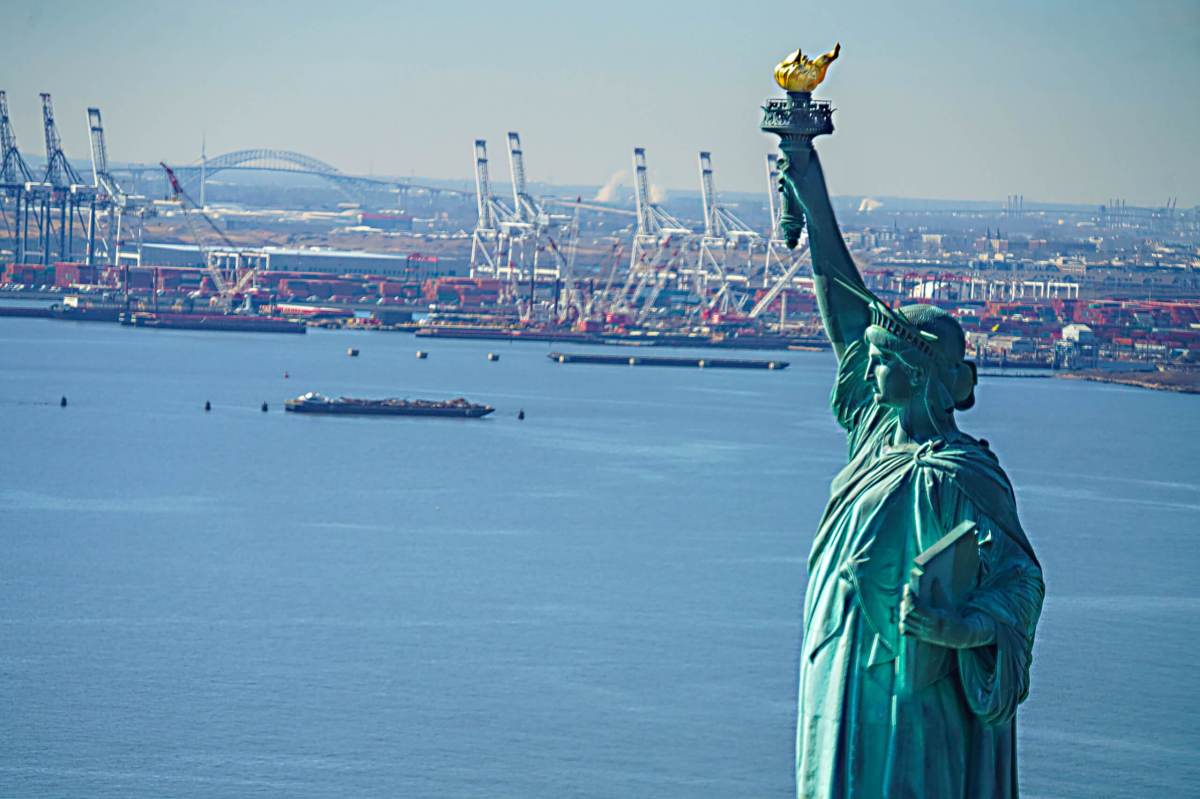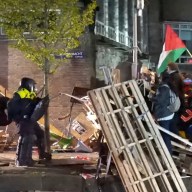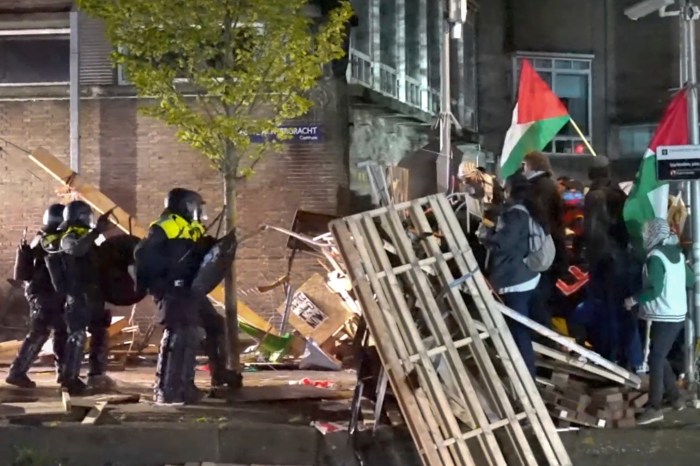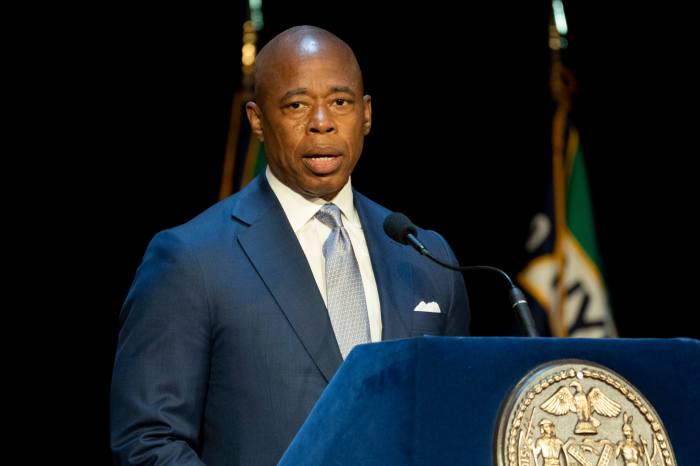Israeli forces took control of the Rafah border crossing with Egypt in the Gaza Strip, pressing on with an offensive in the southern city as cease-fire negotiations with Hamas remain precarious.
The incursion comes after the militant group on Monday said it accepted an Egyptian-Qatari mediated cease-fire proposal. Israel insisted the deal did not meet its core demands. The high-stakes diplomatic moves and military brinkmanship left a glimmer of hope alive — but only barely — for an accord that could bring at least a pause in the 7-month-old war that has devastated the Gaza Strip.
The Israeli 401st Brigade entered the Rafah crossing early Tuesday morning, the Israeli military said, taking “operational control” of the crucial crossing. It’s the main route for aid entering the besieged enclave and exit for those able to flee into Egypt.
More than a million people are huddled in tents and overcrowded apartments in Rafah after fleeing Israel’s military offensive in other parts of the Gaza Strip. Israel says Rafah is Hamas’ last stronghold, but the United States opposes a full-scale invasion of the city bordering Egypt unless Israel provides a “credible” plan for protecting civilians there.
The war in Gaza has driven around 80% of the territory’s population of 2.3 million from their homes and caused vast destruction to apartments, hospitals, mosques and schools across several cities. The death toll in Gaza has soared to more than 34,500 people, according to local health officials.
The war began Oct. 7 when Hamas attacked southern Israel, killing around 1,200 people, mostly civilians, and abducting about 250 others. Israel says militants still hold around 100 hostages and the remains of more than 30 others.
Currently:
— Israeli forces take control of the Gaza side of the Rafah crossing with Egypt.
— The U.N. says there’s ‘full-blown famine’ in northern Gaza. What does that mean?
— Hamas accepts cease-fire proposal for Gaza, after Israel orders Rafah evacuation ahead of attack.
— Biden speaks with Netanyahu as Israelis appear closer to major Rafah offensive.
— Bernie Sanders says Gaza may be Joe Biden’s Vietnam. But he’s ready to battle for Biden over Trump.
Follow AP’s coverage of the war at https://apnews.com/hub/israel-hamas-war
Here’s the latest:
GENEVA — Israel has strict obligations under international humanitarian law to ensure the safety of civilians in Gaza, a spokeswoman for the U.N. human rights office said hours after Israeli forces seized the Rafah border crossing with Egypt in a push against the southern city.
Ravina Shamdasani said that Israel is under obligations to make sure that civilians have access to medical care, adequate food, safe water and sanitation.
“Failure to meet these obligations may amount to forced displacement, which is a war crime,” she said.
Referring to the Israeli operation in Rafah, Shamdasani added: “There are strong indications that this is being conducted in violation of international humanitarian law.”
GENEVA — The U.N. humanitarian aid agency said Tuesday that Israeli authorities have denied it access to the Rafah crossing between Gaza and Egypt that is now in the control of the Israeli Defense Forces.
“Rafah is in the crosshairs,” said Jens Laerke, spokesman for the U.N. Office for the Coordination of Humanitarian Affairs, at a regular briefing in Geneva.
“IDF is ignoring all warnings about what this could mean for civilians and for the humanitarian operation across the Gaza Strip,” he added. “I think it’s fair to say that the reports that we get from colleagues on the ground is that panic and despair has taken hold: People are terrified.”
He said 76% of the territory of Gaza is “under evacuation orders” and people in Rafah have not been given adequate time to abide by evacuation orders.
Laerke said the operations of the U.N. and its partners in Gaza have a “very, very short buffer of about one day of fuel” — primarily diesel to run trucks and generators. “It’s not like there are huge warehouses full of aid” in Gaza because as a general rule it’s distributed upon entry, he said.
BEIRUT — Human Rights Watch said Tuesday that a March 27 Israeli strike on a paramedic center in south Lebanon that killed seven emergency service workers “was an unlawful attack on civilians that failed to take all necessary precautions.”
It added that U.S.-supplied arms were used in the strike in the village of Hebbariye that was carried out using a U.S.-made joint direct attack munition guidance kit and an Israeli-made 500-pound (about 230 kilograms) general purpose bomb.
The rights group called for Washington to stop providing arms to Israel “given evidence that the Israeli military is using US weapons unlawfully.”
Israel at the time of the strike said it had hit a “military compound” and killed a “significant terrorist operative” from the Jamaa Islamiya, or Islamic Group, a Lebanese Sunni political group with an armed wing that has sometimes joined forces with the Shiite Hezbollah militant group as it has clashes with Israeli forces on the border over the past seven months.
Human Rights Watch said it found “no evidence of a military target” at the Lebanese Succour Association-run paramedic center that was struck, and that Islamic Group officials and family members of the seven people killed said they were civilians.
The Islamic Group said that while some of its supporters volunteered as paramedics with the association, “they do not include any fighters from its armed wing.” The report noted that under international law, warring parties “have a duty to distinguish between combatants and civilians” and “in case of doubt whether a person is a civilian, that person must be considered a civilian.”
Israeli strikes have killed more than 370 people in Lebanon over the past seven months, most of them fighters with Hezbollah and allied groups, but also including more than 70 civilians and non-combatants. In Israel, strikes launched from Lebanon have killed 14 soldiers and 10 civilians.
JERUSALEM — An Israeli tank brigade has seized control of the Gaza Strip side of the Rafah border crossing with Egypt, authorities say, moving forward with an offensive in the southern city even as cease-fire negotiations with Hamas remain on a knife’s edge.
The move comes after hours of whiplash in the Israel-Hamas war, with the militant group on Monday saying it accepted an Egyptian-Qatari mediated cease-fire proposal. Israel, meanwhile, insisted the deal did not meet its core demands. The high-stakes diplomatic moves and military brinkmanship left a glimmer of hope alive — but only barely — for an accord that could bring at least a pause in the 7-month-old war that has devastated the Gaza Strip.
The Israeli 401st Brigade entered the Rafah crossing early Tuesday morning, the Israeli military said, taking “operational control” of the crucial crossing. It’s the main route for aid entering the besieged enclave and exit for those able to flee into Egypt.
BEIRUT — Hamas has published a copy of the cease-fire and hostage release proposal that the militant group said it had agreed to on Monday.
The framework brought forward by Qatar and Egypt aims to bring a halt to seven months of war in Gaza. However, it’s unclear if Israel will agree to the terms. The proposal outlines a phased release of Israeli hostages held in Gaza alongside the gradual withdrawal of Israeli troops from the entire enclave and ending with a “sustainable calm” or “permanent cessation of military and hostile operations.”
Israel has previously said it would not agree to either a full withdrawal of its forces or a permanent cease-fire as part of a hostage release deal.
The first stage would last 42 days and would involve a partial withdrawal of Israeli forces from the Gaza Strip and the release of about 33 hostages held in the territory, including the remaining Israeli women — both civilians and soldiers — as well as children, older adults and people who are ill.
Thirty Palestinian prisoners held in Israel would be released in exchange for each Israeli civilian hostage and 50 in exchange for each female soldier.
Palestinians displaced in Gaza would be allowed to return to their home neighborhoods during that time.
The parties would then negotiate the terms of the next stage, under which the remaining civilian men and soldiers would be released, while Israeli forces would withdraw from the rest of Gaza. This phase would be conditioned on achievement of a “sustainable calm.”
The final stage would involve exchange of the bodies of hostages who died in captivity and the beginning of a reconstruction plan for the enclave that would take place over three to five years “under the supervision of a number of countries and organizations, including: Egypt, Qatar and the United Nations.”
TEL AVIV, Israel — Thousands of Israelis rallied around the country Monday night calling for an immediate deal to release the hostages still held in the Gaza Strip.
The protests came as Israel’s War Cabinet voted to begin an operation on the city of Rafah, saying that a cease-fire proposal Hamas accepted earlier in the night was not in line with Israeli demands.
In Tel Aviv, about 1,000 protesters swelled near Israel’s military headquarters, some blocking the city’s main highway until late into the night. Police tried to clear the road, lifting some protesters off the street and extinguishing fires lit during the demonstration. Other officers on horseback surrounded crowds who chanted “deal now!”
In Jerusalem, hundreds of protesters called for a hostage deal. They marched toward the home of Israeli Prime Minister Benjamin Netanyahu, holding a banner reading “the blood is on your hands.”
There were also smaller protests in the cities of Haifa, Beersheba and Raanana.
Israeli police did not immediately respond to a request about the number of people arrested.
In front of Netanyahu’s house stood Mai Albini Peri, the grandson of Haim Peri, a hostage in Gaza. He held a sign that read, “Rafah, not at the expense of my grandfather.”

















